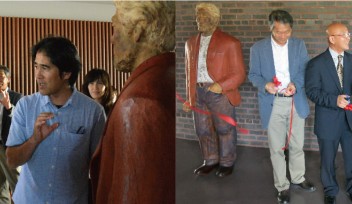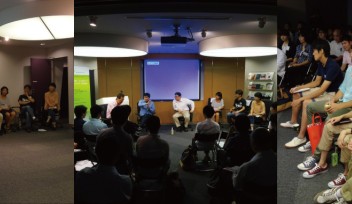In the Name of a Great Leader

On the evening of May 14, OIST welcomed Mohau Pheko, Ambassador Extraordinary and Plenipotentiary, Embassy of the Republic of South Africa. She gave the Nelson Mandela Memorial Lecture titled “Can Science and Technology Promote Development and Democracy?” She answered the question with a resounding “yes!” With nearly 300 audience members in attendance, her thought-provoking presentation left many in the audience with a new appreciation of the need for development of science and technology in Africa.
President Jonathan Dorfan, himself a native of South Africa, opened the Nelson Mandela Memorial Lecture with a remembrance of his countryman’s great accomplishments and contributions. President Dorfan referred to Mandela by his nickname ‘Madiba’, saying he was “always smiling, always confident in his mission,” and that “his example of humanitarian work and compassion is one we must never forget.”
After President Dorfan introduced Ambassador Pheko, she began her lecture by illuminating the rich history of science and technology on the African continent. Examples spanned from architectural feats such as the great pyramids in Egypt to 35,000-year-old math textbooks describing division and multiplication to practices still used in modern medicine. However, this legacy of science and technology has been stifled in the recent past due to unrest and lack of investment.
The Ambassador illuminated the differences in education, scientific investment and patents between different countries around the world. Japan featured prominently in nearly every category, while it was apparent that Africa lacked many of the tools that lead to success in science and technology. She pointed out that “if you’re going to use science and technology to drive democracy, you’ve got to have it.”
Despite the current discrepancies between Africa and other countries, she had a message of hope. The economies in Africa are growing, and now is the time to funnel more resources into science and technology to fuel job creation and further economic growth. She believes a mix of internal government funding and foreign investment is the best strategy. As she spreads this message around the world, the Ambassador says she is asked by some why Africa should develop more science and technology when there are so many issues of unrest and basic life necessities that are lacking for so many. Her response was, “we need to send satellites up to see flooding, to identify where global warming is impacting the continent, to see what’s happening to herds of animals and to develop strategies to help ease these problems.” She added, “this is where we can form collaborations with countries like Japan and institutions like OIST to resolve many of the challenges on the African continent.”
She ended the lecture by saying “I hope that I have touched a nerve to begin a discourse here that will help develop science and technology partnerships with Africa.”
By: Kathleen Estes
For press enquiries:
Press Inquiry Form















